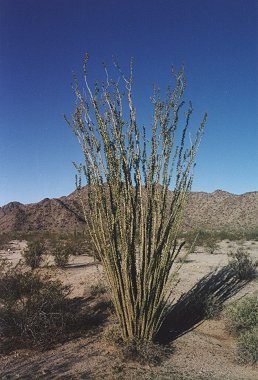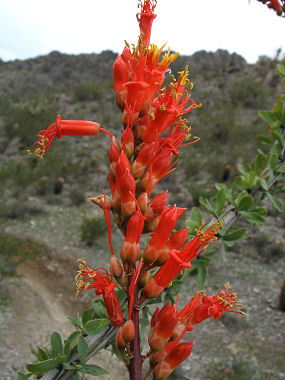The Ocotillo is a member of the ocotillo
family. First to clarify a few misconceptions:
1) Ocotillo is pronounced oh-ko-TEE-oh, not ah-ko-TEE-oh.
2) The plant is
frequently described in print as a cactus, it is not . .
Ocotillo is a woody shrub which grows from 10 to 20 feet tall. It
consists of long, thin, mostly un-branched, spiny stems that grow from a
central location at the base of the plant. It grows in a wide variety of
desert habitats below 5000 feet in elevation. The ocotillo is drought
deciduous, which means it loses its leaves in dry periods, growing them
back in response to recent rains (usually within 2-3 days of a recent
storm). This process may occur several times during the course of the
year. Leaves, when they are present, are small, oval and green and grow
to 2 inches in length.
|
Mature Ocotillos may have up to
75 branches. |
The plant blooms between March and June and forms
clusters of red, tubular flowers (which are about 1 inch in length) at
the tips of the canes. The color and shape of the flowers suggest
pollination by hummingbirds. While Ocotillo nectar is an important
energy source for migrating hummingbirds, which in turn, provide some
aid in pollination of the plant, studies have shown that bees are
probably a more important source of pollen transfer for the plant.

|

